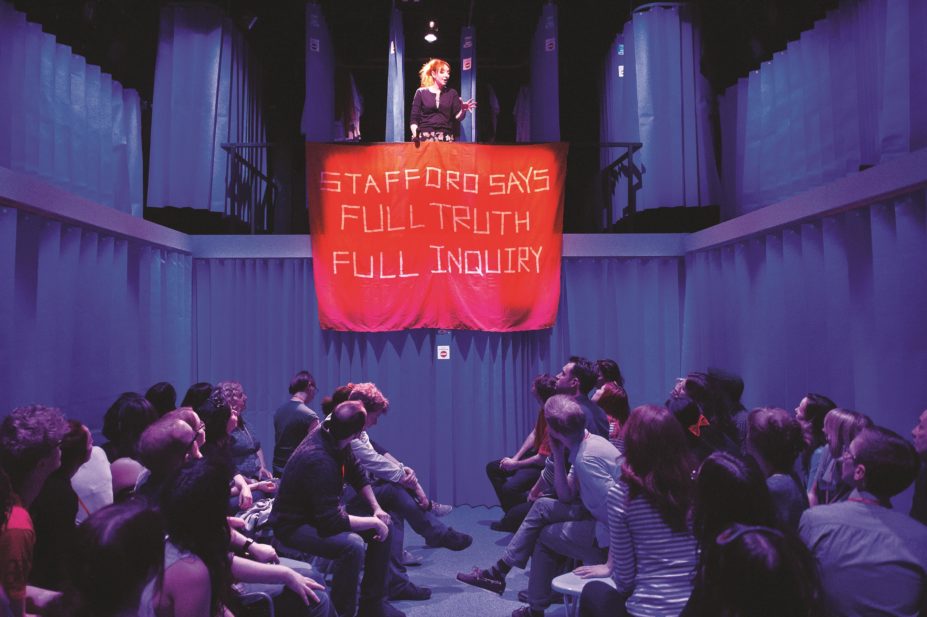
Tristram Kenton
The future of the NHS is an emotionally charged subject, particularly in the weeks and days approaching a general election. While politicians promise billions in additional funding, and claim once again that there will be no top-down reorganisation, Michael Wynne’s play Who cares?, directed by Debbie Hannan, Lucy Morrison and Hamish Pirie, gives voice to the NHS staff, patients and managers. Their stories, which Wynne gathered over 18 months of interviews, are told through eight cast members, most of whom switch between different roles throughout the performance.
In the opening scene, the audience is crammed around the edge of a chaotic accident and emergency waiting room. While normal service goes on in the department — patients become rowdy at waiting too long, the cleaner mops the floor, staff are rushed through double doors — lifelong nurse Marjorie and junior surgeon Jonathon tell their personal tales. Other cast members intersperse facts about the NHS. “There were two polls done at the millennium … ‘What’s the most important event of the twentieth century?’ Nearly 50% said creating the NHS and only 18% said winning the second world war.” There are other snippets of stories about problem patients and the trouble of meeting targets.
The audience is then led in small groups into different areas of The Royal Court Theatre and meet various characters in more depth. Although the audience is not expected to participate, the characters speak directly to people at times, and paramedic Dave lends his jacket to a shivering woman.
The settings are small and cleverly constructed so that these interactions feel like intimate chats — the deeply personal nature of the conversations add to this sense. Nurse Hannah, played by Martina Laird, who we encounter in the smoking area, tearfully admits that “I come home, collapse, often have a little cry. And I think — I can’t do this for ten, 20 — I can’t do this till I…”

Source: Tristram Kenton
Robert Bathurst, as Andrew Lansley, throwing the Health and Social Care Act off the balcony
Probably because the stories are real, all of the voices are credible, injecting moments of humour, lightness and nostalgia into tales of struggle. In several of the vignettes, the message resonates that medicine is not magic and patients have to be realistic about their expectations. Robert Bathurst, in one of his roles as consultant cardiologist, paints a bleak picture of the real survival rates following a cardiac arrest — and suggests that those who are unsettled should go back to watching BBC drama Holby City.
No one gives the impression that the NHS is thriving. Instead, it seems to be drowning under bureaucracy, targets, limited staff and an excess of patients.
Throbbing through the first act is the underlying influence of politics, but this becomes explicit in the second act. The play bashes Andrew Lansley’s Health and Social Care Act and criticises the privatisation of the NHS although a voice is given to the NHS regulator and Jim, a managing director of a privately owned healthcare company. There is a somewhat confusing message that politics should not influence the NHS, but an acknowledgement that you cannot take the politics out of a £110bn public service.
The politicians leading the NHS use it as a political weapon to win elections. “They’ve both got policies that are about getting into power,” Jim comments in reference to the Conservative and Labour parties.
The marriage of heart-wrenching personal stories with polemics can feel like a crude manipulation. But the writer is so upfront about his agenda that there is no overall sense of being conned. Given what the play is trying to achieve, then, it is a pity that the audience seems, based solely on the chorus of nods and resigned expressions, to consist largely of individuals who already agree with Wynne, and not the policymakers and patients that the play needs to reach.
Be under no illusions — this is not an uplifting romp through the NHS nor an entertaining night out at the West End, though this is not to criticise the quality of the acting or production. Despite this, it should be recommended viewing for every politician in Westminster, if only to help them understand the views of the NHS frontline.
Who cares? is showing at The Royal Court Theatre, London, until 12 May 2015.


